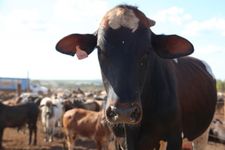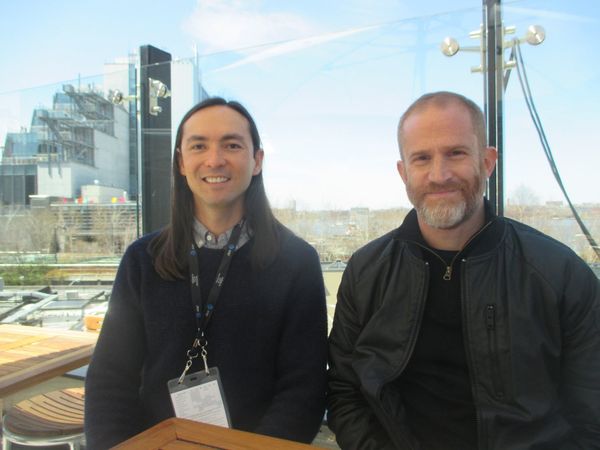 |
| This Is Climate Change creators Danfung Dennis and Eric Strauss on the STK Downtown rooftop with the Whitney Museum of American Art in the background Photo: Anne-Katrin Titze |
Virtual Reality Docu-Series This Is Climate Change is being presented by Danfung Dennis and Eric Strauss during the Tribeca Film Festival at the Cinema360 VR Theater inside the festival Hub at Spring Studios. The directors joined me for a rooftop conversation at STK Downtown on Little West 12th Street. We started out with Danfung's Melting Ice with Al Gore which premiered at Sundance in 2017 and moved on to Feast showing here with Fire and Famine.
In Feast we land out in the rain forests of Brazil that are being cut down with alarming speed to make room for financially more profitable cattle ranches. The physical closeness to the impressive animals has an emotional effect that should not be underestimated. When the cows are led to the abattoir, along a narrow walled-in calvary designed by Temple Grandin, we follow them right up to the gate. Deforestation and that burger so casually consumed go hand in glove. It is the perfect example that action can be taken by everyone and that individual choices add up and can constitute a gigantic problem.
Anne-Katrin Titze: One of your four films was shown at Sundance, the other three will premiere in about an hour down in Tribeca.
Danfung Dennis: [Melting] Ice was at Sundance previously and then the other three premiering today.
AKT: Is there a specific order you would like people to see them in?
DD: You know, they're more pairings. Melting Ice and Fire are paired together and then Feast and Famine are together. But either one can be watched or talked about first.
AKT: The one I saw first, by coincidence, was Feast, which left a very strong impression on me. Because of the way it is made and presented in VR, I felt I was in with the cattle going into the abattoir. The ending is terrifying, and terribly strong. How did you deal with that scene? Were you hesitant to actually go there? Did you think it's necessary?
DD: I thought it was very important to film inside the slaughterhouse, the process that the cows go through. Because it ties it back to our own every-day decisions. Usually that production process is hidden. Everything about it is hidden.
The logging, which is illegal. We think of the Amazon Rainforest as protected and it is. There are many laws in Brazil but they are not enforced, especially in the lawless regions in the western part of the country. We knew we wanted to film everything from the pristine forest and how it is when it is untouched and show the process all the way through to the final product, a piece of meat ready for consumption.
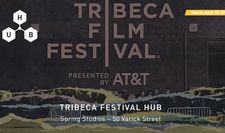 |
| Tribeca Film Festival Hub at Spring Studios |
Usually we don't give a second thought to our food. It's just every day a normal decision. So VR has this ability to illuminate in a very visceral way our own decisions and the ripple effect it has through the supply chain. The slaughterhouse was very difficult to witness. Even before the cattle get there you see how devastated the landscape becomes.
It's also confusing because the Rainforest is full of these trees but only a very small percentage of them are hardwoods that are harvested for the timber industry. The vast majority of this land is being cleared for cattle and grazing and even more so for the soy crops. 87% of all soy is being fed to cattle. So it is this sort of chain of events that we're trying to connect all the way back to us.
AKT: You do it in an incredibly condensed way. First off, I had never made the connection between the deforestation of the Rainforest and the final product of beef. I don't eat meat anyway, but this link was new to me. People I talked to afterwards were surprised too. We do not connect beef with the Rainforest.
DD: That is absolutely true. When we started showing this piece, people were very surprised, our colleagues, that this connection even existed. We were really trying to bridge that disconnect. We had on one side the destruction of the environment which is heart-wrenching in itself.
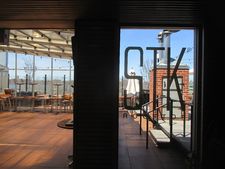 |
| STK Downtown rooftop on Little West 12th Street Photo: Anne-Katrin Titze |
These beautiful rivers and trees that are being cleared away for these mass feeding lots. Then you get to the animals themselves - they are sentient, they have families, they feel pain. They are very similar to us in many ways. And when you are very close to these animals you can start to take the perspective of what they are enduring.
The kill chute is where we are starting in terms of this actual slaughterhouse. I felt that was the most important area to be filming. Once you are inside it's really a mechanical process. Before they're killed is when they are feeling the terror and you can see it in their eyes, you see it in their behaviour, they are terrified. All of this is just to meet the demand of the taste of beef.
AKT: I thought if your film gets one person to stop eating beef then you've done a marvellous job. I hope a lot of people see it and start to think twice about their steak.
Eric Strauss: I have to say, when I came on to this project I was not quite as aware of this connection as Danfung at the time. And witnessing that despite policy changes and laws all of this keeps moving forward regardless because there's enough money, there's enough appetite that it will just push past all the laws that are in place.
And when you really begin to understand how important those trees and that forest is for your own survival, I certainly hope viewers will begin to understand you do have to take some action. You have to take some responsibility because that chain of events that you witness starts and ends with your choices.
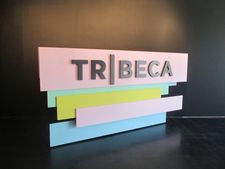 |
| This Is Climate Change at the Tribeca Film Festival Photo: Anne-Katrin Titze |
AKT: And people can make a decision immediately after seeing it and not have that burger. Just stop it. Have a salad.
ES: Absolutely. It's one of the more immediately empowering examples.
AKT: Being so close to the animals in VR is great. My first experience with the device on my head actually was one of yours, Danfung, being dropped into a herd of buffalo [in American Bison]. I jumped in my seat because I didn't look to the left and there it was so close. It's the first time I understood what VR can do and why it's important. You put us into positions that we can never be in. It's just a camera, as a human being you could never be like that in a herd of animals.
DD: One of the beautiful things about VR is that you can start giving people experiences that are impossible to have, even if you're actually there. You get to change your perspective, you can dissolve your ego and your usual first-person perspective and lift your own consciousness out and place it into that of another, whether that's an animal or another person or even an inanimate object. That will give people that moment of reflection of: Am I participating in this violence?
And if you say, I don't endorse this violence or this destruction of the forest, then I do have to take personal responsibility. The hope is that people will make that connection. That the memory of being there very close to these animals, very close to this forest will inform their decisions and their behaviour for time to come. How long the impact will stay with you is still unknown. It lingers because these VR experiences encode more as memories than they do as I watch something.
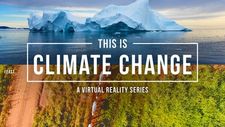 |
| This Is Climate Change poster |
They have done research, when you recall a memory after a VR experience it takes longer than if you watched a film because you're accessing the same process as real memories. At a certain level your brain isn't able to differentiate if it's real or not. We know it on one level but at a lower level your brain and your body is interpreting it as real. So when presented with the decision of will I pay someone to kill an animal, to destroy the forest for my own pleasure - at that decision point that memory should come back. I am aware of this connection and I will choose the more ethical decision at that point. And you're presented with that decision every day.
Coming up - ?Danfung Dennis and Eric Strauss in conversation on Fire, Famine, and experiencing Melting Ice with Al Gore in This Is Climate Change?
This Is Climate Change daily at 2:00pm and 6:15pm at the Tribeca Film Festival Hub at Spring Studios, 50 Varick Street.
The 17th edition of the Tribeca Film Festival presented by AT&T runs through April 29.








